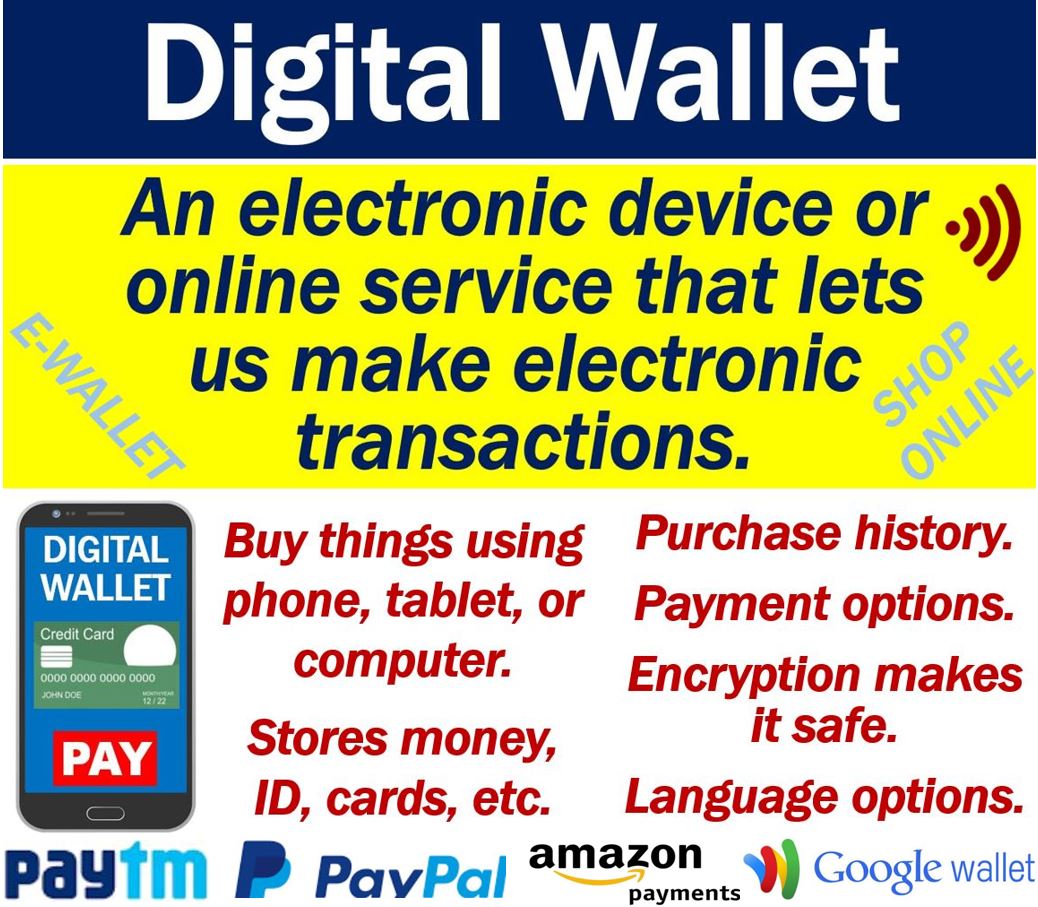What is a digital wallet? Definition and examples
A Digital Wallet is a system that securely stores a person’s payment information. It stores the user’s cards digitally for payments that will be made online through an electronic device. ‘Digitally‘ means using digital or computer technology. If something is ‘digital,’ it exists purely in electronic form.
We also call it an E-wallet. Some E-wallets let the user add their driver’s license, loyalty cards, and insurance cards.
As technology continues to advance, the role of digital wallets expands beyond payments, encompassing features such as loyalty card storage, identification management, and even the safekeeping of cryptocurrencies.
Some also let users store their health cards and other IDs that we usually keep in a wallet. The term ‘ID’ means ‘identification.’
A digital wallet can also refer to where a person stores their cryptocurrencies, i.e., a cryptocurrency wallet. A cryptocurrency is a kind of digital money, i.e., online money, such as Bitcoin.
Digital wallets, banking apps, and other innovations in the world of finance are examples of fintech, which stands for financial technology.

Why have a digital wallet?
A digital wallet aims to eliminate the need of carrying a physical wallet. It is also more difficult to steal an E-wallet than a physical one.
However, users may lose some of their privacy. Unlike a physical wallet, a digital wallet has information on the owner’s purchasing habits. Companies can get hold of that information.
What makes up a digital wallet?
The digital wallet consists of two things, the software and the data:
-
Software
The software keeps the entire information stored in the wallet. It also secures the information by encrypting it.
-
Data
The data, on the other hand, is all the information that users provide. Users’ names, card details, addresses, for example, form part of the data that the digital wallet stores.
To be able to use an e-wallet, users must have the software installed on their electronic device. They then add the necessary information. Only then can they perform a transaction.
Transaction processes
Transaction processes are not all the same. Wallets’ processes depend on the software that they use.
Some wallets may ask the users to insert their password to confirm transactions.
Others, on the other hand, may give users a different identification code for each transaction.
The electronic wallet updates every transaction. It stores the details of all transactions on an online database.
The five leading digital wallets today, according to Credello, are Apple Pay, Google Pay, Cash App, PayPal, and Venmo.
Integration of biometric authentication methods, such as fingerprint or facial recognition, adds an extra layer of security to digital wallets, enhancing user protection and streamlining transaction authorization.
The largest companies to provide users with this service are Google, Amazon, and PayPal.
Compound phrases
A compound phrase is a term consisting of two or more words. There are many compound phrases containing the words ‘digital wallet.’ Let’s have a look at some of them:
-
Mobile digital wallet
A digital wallet accessible through a mobile device.
For example: “Many consumers prefer using a mobile digital wallet for convenient on-the-go transactions.”
-
Cryptocurrency digital wallet
A digital wallet specifically designed for storing and managing cryptocurrencies.
For example: “Investors use a cryptocurrency digital wallet to securely store their Bitcoin and other digital assets.”
-
Contactless digital wallet
A digital wallet that enables transactions without physical contact, often using NFC technology.
For example: “With a contactless digital wallet, users can make payments simply by tapping their smartphones.”
-
Multi-currency digital wallet
A digital wallet capable of holding and transacting with multiple currencies.
For example: “Frequent travelers find a multi-currency digital wallet valuable for managing expenses in different countries.”
-
Biometric-secured digital wallet
A digital wallet that employs biometric authentication methods like fingerprints or facial recognition for enhanced security.
For example: “For added security, the biometric-secured digital wallet requires a fingerprint scan before authorizing any transactions.”
Video – What is a Digital Wallet?
This interesting video presentation, from our sister channel in YouTube – Marketing Business Network, explains what a ‘Digital Wallet’ is using simple and easy-to-understand language and examples.

